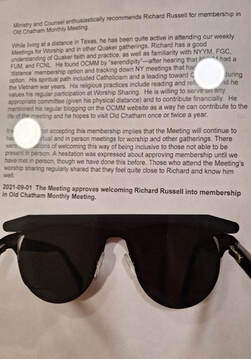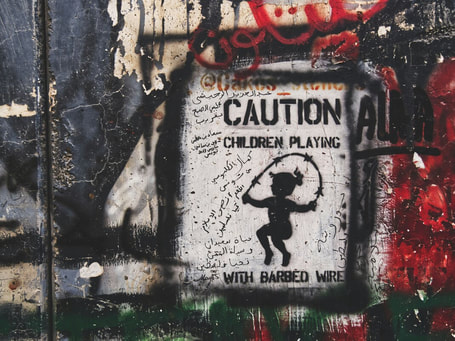|
The taproot of simplicity is to be found at that point in the life of a Friend when the realization comes that his or her inner and outer lives are connected, that for the inward life to continue to grow, there must be a response from the outward life. It is at that point where awareness dawns that spiritual knowledge itself comes from an open relationship between one’s inner and outer lives, and from a free movement between the two.
~ from Frances Taber’s Pendle Hill Pamphlet, Finding the taproot. https://pendlehill.org/product/finding-taproot-simplicity-movement-inner-knowledge-outer-action/ Quoted by Brian Drayton in his Midweek Meditation for Feb. 21 https://neym.org/events-calendar/2023/09/midweek-meditations ~ submitted by Richard Russell
2 Comments
In ancient Rome, a victorious general would return to the city in a triumphal procession that included his army together with captives and spoils taken in the war being celebrated. But as the general rode through the city in a four-horse chariot, a slave standing behind him in the chariot would whisper in his ear, “Memento mori”—"Remember that you will die.”
In like fashion, Christians celebrate Ash Wednesday by receiving on their forehead ashes in the form of a cross while the priest says, “Remember you are dust, and to dust you shall return.” The Stoic philosophers of Greece and Rome counseled frequent meditation on one’s mortality, not as a grim habit, but as a realization that life is fleeting and should be lived to the fullest. In his Meditations, Marcus Aurelius, the Stoic Roman emperor, wrote, “You could leave life right now. Let that determine what you do and say and think.” The Daily Stoic (https://dailystoic.com/memento-mori/) explains the idea: Meditating on your mortality is only depressing if you miss the point. It is in fact a tool to create priority and meaning. It’s a tool that generations have used to create real perspective and urgency. To treat our time as a gift and not waste it on the trivial and vain. Death doesn’t make life pointless but rather purposeful. So, when I, a Christian Quaker, received the ashes this past February 14, I felt joy, not sadness—resolve, not helplessness. I recommend some version of Memento Mori to all Friends—Christian, Stoic, Buddhist, Sufi, or whatever spiritual path a Friend has chosen. ~ Richard Russell Photo by Richard Russell I’m usually skeptical of people who fear that machines and artificial
intelligence will diminish our humanity; but, today, it occurred to me that they may have a point. I went to an eye clinic that specializes in cataract surgery. For two hours I was shuttled from one machine to another. The medical assistants who operated the machines worked with a speed that’s not possible for me in my old age. These young women (Where were the males?) almost seemed like appendages to the machines, enabling the fast and efficient operation of these instruments but largely ignoring me except as an object for analysis. Friends are different. We’re usually slow and very interested in the humanity and personality of those we deal with. And when I say we’re slow, I mean slow. It’s a good thing that Quakers are pacifists or pacifist sympathizers because we could never make the quick decisions necessary on a field of battle. Of course, I favor “slow” but am sometimes irritated by the length of time it takes to get an item from discussion to committee to Business Meeting and possible approval. Still, Quaker “slow” is better than modern “fast.” Quaker process preserves our humanity and respects the Inner Light Within. ~ Richard Russell https://unsplash.com/photos/caution-children-playing-graffiti-oqCRCYUiJpw https://unsplash.com/license Upon reflection of my time in South Africa I can clearly say that the vestiges of Apartheid are still indelibly upon the native people of South Africa. At the end of the era in which the struggle for racial equality reached its peak (around 1990) the Afrikaaner government called the ANC a terrorist organization. The man who would lead the ANC was jailed on Robbin Island breaking big stones into little stones.
One mans terrorist is another mans freedom fighter. The reality is that Nelson Mandela was a bomb thrower before he was the president of the ANC and asked for Truth and Reconciliation. The United States has had a similar history. Thankfully, the civil rights movement here was non-violent. However, the generational damage to people of color is deep. Can you believe the civil rights act was only passed in 1964? There is still much work to be done. The election of a black president has not put us in a post-racial era. If anything, we are dealing with a similar kind of backlash that happened after reconstruction in the post civil war period. What we are seeing unfolding in Palestine is also apartheid. And in my way of thinking it is the worst kind of apartheid because it comes on the heels of one of the greatest atrocities in human history -- the holocaust. Israelis ought to know better based on their history. Germany treated jewish people badly because they were deemed a security threat. South Africa treated blacks and colored people badly because they were deemed a security threat. The US treats blacks and people of color badly to this day because they are deemed a security threat. Israel treats Palestinians badly because they are deemed a security threat. One has to ask why this madness keeps happening? One has only to look at income inequality and the answer becomes abundantly clear. Humans can be very generous if they want to be ... or they can act in the most heinous ways. All forms of apartheid, in my humble opinion, are myriad forms of selfishness cloaked under the giant umbrella of "security." And by selfishness I mean the unwillingness to share economic opportunity. For 300 years Europeans and Americans enslaved black people to generate enormous wealth on plantations. The English (and then the Afrikaaners afterward) used apartheid to separate people from their land and self sufficiency in order to get them into wage slavery. Today the average wage there is $1.50 per hour. Germans were sold a bill of goods (after the treaty of Versailles) that the Jews were the source of their economic problems when in fact it was just garden variety greed and expansionism from WWI that caused the economic collapse of Germany in the 1920's and 1930's. Here's a question: how desperate do you think a group of people has to be to start a war they know they will lose just to bring the attention of the world to their dire and extremely tragic living situation? The queries we could be engaged in at this moment in history are:
~ Joseph Olejak I tend to be suspicious of martyrs whose suffering may be needless and useless in attaining the ends of that suffering. But I do find heroic the suffering of the Quakers imprisoned after the March on the Pentagon in 1967. In protesting the Vietnam War, some of these Friends refused to eat or drink and were fed intravenously as a consequence. Others refused to wear prison clothing and were thrown naked into freezing, cramped cells. Norman Mailer has written about them in his book, The Armies of the Night (1968, pp. 287-288, New York: Signet):
Did they pray, these Quakers, for forgiveness of the nation? Did they pray with tears in their eyes in those blind cells with visions of a long column of Vietnamese dead, Vietnamese walking a column of flame, eyes on fire, nose on fire, mouth speaking flame, did they pray, “O Lord, forgive our people for they do not know, O Lord, find a little forgiveness for America in the puny reaches of our small suffering….” The prayers are as Catholic as they are Quaker, and no one will know if they were ever made, for the men who might have made them were perhaps too far out on fever and shivering and thirst to recollect, and there are places no history can reach. But if the end of the March took place in the isolation in which these last pacifists suffered naked in freezing cells, and gave up prayers for penance, then who was to say they were not saints? And who to say that the sins of America were not by their witness a tithe remitted? ~ submitted by Richard Russell |
This blog was set up to post content of interest to Old Chatham Quaker members and attenders. Posts related to one's own personal spiritual journey, reports based on interviews with others, and reflections on Quaker-related topics are welcome. Posts by individuals are personal expressions and do not necessarily reflect those of the Meeting as a whole.
Guidelines for posting on website blog:
Submit to member of Communications committee; committee has editorial oversight over all content posted on the Meeting website. Be respectful of the nature of vocal ministry given in Meeting for Worship or other settings and any private conversations about spiritual matters. Cite source of any image or other external content submitted. Archives
July 2024
Categories |


 RSS Feed
RSS Feed